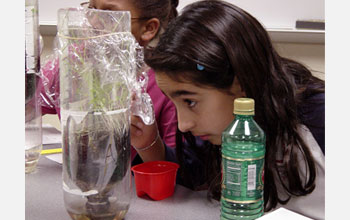|

Press Release 08-092
Engaging the YouTube Generation in Hands-on Science

An experiment using readily accessible ingredients helps middle-school students soak up science
June 2, 2008
Many of us remember a science class where we first had opportunities to conduct experiments. It may have been our first exposure to the scientific method, as we investigated phenomena, presented hypotheses and shared results. The National Science Foundation (NSF) helps make research experiences accessible to students at all levels, and supports classroom math and science teachers through a number of programs encompassing teacher preparation, professional development, and partnering and mentoring opportunities with higher education faculty in science, technology, engineering and mathematics (STEM) fields. In addition, a select group of teachers has an opportunity to serve at NSF through the Albert Einstein Distinguished Educator Fellowship Program. Cherlyn Anderson is one of eight Einstein Fellows spending this academic year at NSF. In her other life, Anderson is an eighth-grade science teacher in South Carolina. She has used an experiment involving Mentos candy and Diet Coke as a teaching tool. The accompanying video offers a demonstration of the experiment, and discusses its benefits for eighth-grade science students.
-NSF-

Media Contacts
Maria C. Zacharias, NSF (703) 292-8070 mzachari@nsf.gov
Related Websites
Einstein Fellows press release: http://www.nsf.gov/news/news_summ.jsp?cntn_id=110003

The National Science Foundation (NSF) is an independent federal agency that supports fundamental research and education across all fields of science and engineering. In fiscal year (FY) 2009, its budget is $9.5 billion, which includes $3.0 billion provided through the American Recovery and Reinvestment Act. NSF funds reach all 50 states through grants to over 1,900 universities and institutions. Each year, NSF receives about 44,400 competitive requests for funding, and makes over 11,500 new funding awards. NSF also awards over $400 million in professional and service contracts yearly.
 Get News Updates by Email Get News Updates by Email
Useful NSF Web Sites:
NSF Home Page: http://www.nsf.gov
NSF News: http://www.nsf.gov/news/
For the News Media: http://www.nsf.gov/news/newsroom.jsp
Science and Engineering Statistics: http://www.nsf.gov/statistics/
Awards Searches: http://www.nsf.gov/awardsearch/
| 


